In Australia, it takes two days of training, a thorough test, and a government “License to Perform High Risk Work” to be allowed to sit on a chair and watch another person fasten light fixtures to the ceiling. Not even kidding.

An example of Australia’s over-the-top safety culture. I saw this sign in an alley downtown outside the back door of the post office. Yes, to sort the mail you must wear a hi-visibility (“hi-vis”) safety vest and steel-toed boots.
I’ve discovered that America, my homeland, has an international reputation as a place fraught with legislation and full of silly people suing each other for things like blinking at an inconvenient time. Don’t believe everything you see on T.V., folks. If this Hollywood version of a place even exists, Australia is definitely a candidate.
As such, before I was even allowed to fly up to the work site, I spent hours at “training” in the city to obtain several pieces of paper required to confirm I possess common sense necessary for mine/construction sites, I possess the primary employer’s version of common sense, I know how not to fall off the edge of high places, I know how not to get electrocuted, I know that small spaces can be filled with lethal gasses, I understand petrochemicals and mother nature shouldn’t mix, and I still know basic first aid and how to drive a forklift.
What my job — “Electrical Trade’s Assistant” — actually entailed morphed and changed throughout my tenure. Originally I understood I would be half store-person, half fork-lift driver and sometimes field labor.
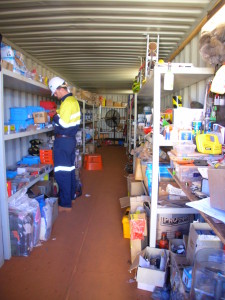
“The Stores” – a 40 foot shipping container full of all the “bits and pieces” needed to install various components in mine-site facilities. And one of my “workmates.”
After about a week organizing “the stores” and learning the Australian name for many of the materials, “spotting” became my principal occupation. In the land down under, mine site thinking alleges that it is unsafe for an individual to work in a cherry picker without having a person standing by on the ground just in case the person in the basket were to suddenly become incapacitated and unable to operate the machine controls.
More than half of my first three months were spent standing there bored out of my skull, begging for tasks to keep my brain turning over and assaulting passersby with my insatiable curiosity. The bulk of the rest of my time was spent keeping the shelves of two shipping containers organized and stocked. Beyond that, I acted as a go-fer and assistant, making runs for nuts, bolts, and myriad other gear needed to install electrical components.
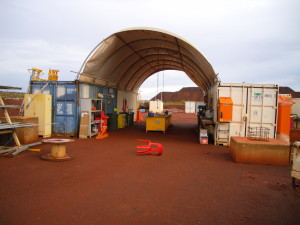
“The Dome” i.e. the electrical workshop – a great place to get out of the sun if there is lots of welding, metal cutting, or drilling to be done.
The last three months (to encourage foreigners to fill migrant-labor positions, Australia only allows those on my visa to work six months for the same employer), my daily tasks became more varied. My background in mining and construction helped in a basic sense, as did my general fitness as confirmed by the doctor at my pre-employment physical who repeatedly told me my strength was off the (female) charts. However, industrial construction — specifically Australian industrial construction — uses methods and materials quite different to the commercial and residential construction I’ve done.
As my crew’s goal was to install all the electrical components inside new mine-site facilities, I spent lots of time “pulling cable.” Sometimes this was a massive, heavy, insulated copper sausage coming from the sub-station through plastic conduits and concrete access pits, and sometimes it was a Twizzler-sized, orange-sheathed group of wires running from the industrial equivalent of a fuse box out to all the switches, lights, outlets, etc.
I spent plenty of time cutting lengths of metal – pipe and “uni-strut,” – drilling holes through metal to mount various electrical components, using zip-ties to keep all the cables looking tidy, and fastening things together with nuts and bolts. Occasionally there were bouts of driving a “telehandler” — a forklift on steroids with the ability to extend and retract (i.e. telescope) the forks several meters.
Socially, things were… interesting.
Given my previous experience in male-dominated work places, I wasn’t naive enough to expect that I’d be among the majority. I was a bit shocked however, fresh off my first plane trip to site, to look around the bus and realized that I was the *only* woman present. In camp that night, a soccer ball came flying over the tall fences and bounced across my path. When I chased it down, a player yelled to a far-off guy on the same mission, “Don’t worry. A female is getting it.” To which a chorus of others responded, “A female?!”
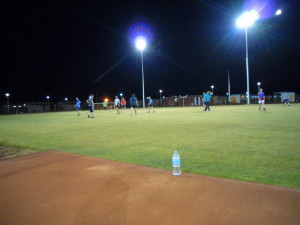
The playing field at one of the camps where after work games are played a few nights a week. (Not the one with the high fences mentioned in this entry.)
Not that there weren’t (a few) other women: there’s a good reason every person I introduced myself to guessed that I was either a new admin girl, a safety officer, or camp staff. And for my first month, the guys in the field were way nicer than I’ve come to expect from similar American work sites. I also knew I’d repeatedly be assumed incompetent and incapable until proven incompetent and incapable. Sadly, technical knowledge and ability tends to be equated with gender. A woman in a blue-collar work place is generally damned if she does and damned if she doesn’t. Example: if she drives with confidence, it’s because she’s a girl who doesn’t know to be more careful. If she drives defensively, it’s because she’s a girl who doesn’t have appropriate skills behind the wheel.
So even though I was disappointed each time a buddy of mine would be taken aback when they happened upon me operating equipment or running power tools, I wasn’t surprised. If you buck the system, you’ll earn a few bruises, eh?
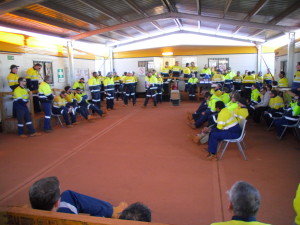
The citizens of said “small town.” It’s my experience that in places where things change very little from day to day and emotional gratification is delivered via electronic screens and alcohol, folks tend to have a very high degree of interest in others’ private lives.
Developments in my romantic life also complicated things. Remember Beach Tour Guide? Well as I started my job, we were slowly settling into a relationship. But. It just so happened that BTG was my boss’ boss, a fact that sets the stage for tons of drama on a worksite that is basically a very small town of 150 people.
In the hopes of preserving the possibility that co-workers might judge me based on their own experience with me versus the hottest news off the grapevine, I elected not to mention my ties to BTG — a painful choice for a woman who can’t stand lying. When people queried me directly, I had to change the subject, answer in the affirmative while laughing, or not answer at all.
I also didn’t want my workmates to think I was some version of a Russian spy, entrenched simply to deliver intelligence back to headquarters. Along with the whole “no lying” thing, “tattle-telling” is at the top of my list of inexcusable behaviors. Sometimes this was a lose-lose, leaving me at the mercy of suspicious co-workers and leaving my beau disappointed when I refused to answer work-related questions.
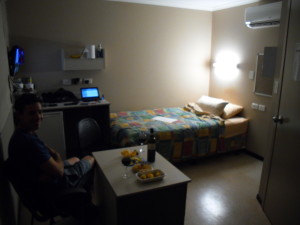
The price of privacy? Being reduced to behind-closed doors dates over smuggled cafeteria food and wine. (Full disclosure – I never made my bed. This just happened to be the day rooms in my block got cleaned.)
And just when I thought things couldn’t get worse, BTG got promoted from being my boss’ boss to everyone’s boss’ boss. Suddenly he was the president and I was the intern, and our relationship-gossip-value went through the roof. As did the opportunity for a few dozen more employees to suspect that at the end of a long work day, in the thirty minutes before I went to sleep, that I might want to spend time talking to the boss about them instead of anything-but-work.
The pressure required to keep a high-profile in order to maintain my privacy and professionalism ran pretty high the last few months. My opportunities to forge friendships suffered. How do you get to know someone if you can’t ask them about their life for fear they’ll ask you about yours? Especially when you’re a person that abhors lying? Tough gig.
Would I take back the last six months?
No.
Would I do it again?
No.
Did working 84 hours a week for four weeks straight over a course of six months make me deeply appreciate my former, well-balanced life?
You betcha, sweet cheeks. ♣
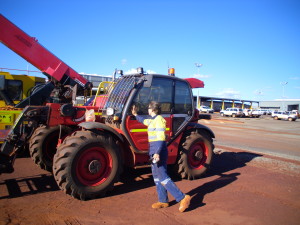




6 pings